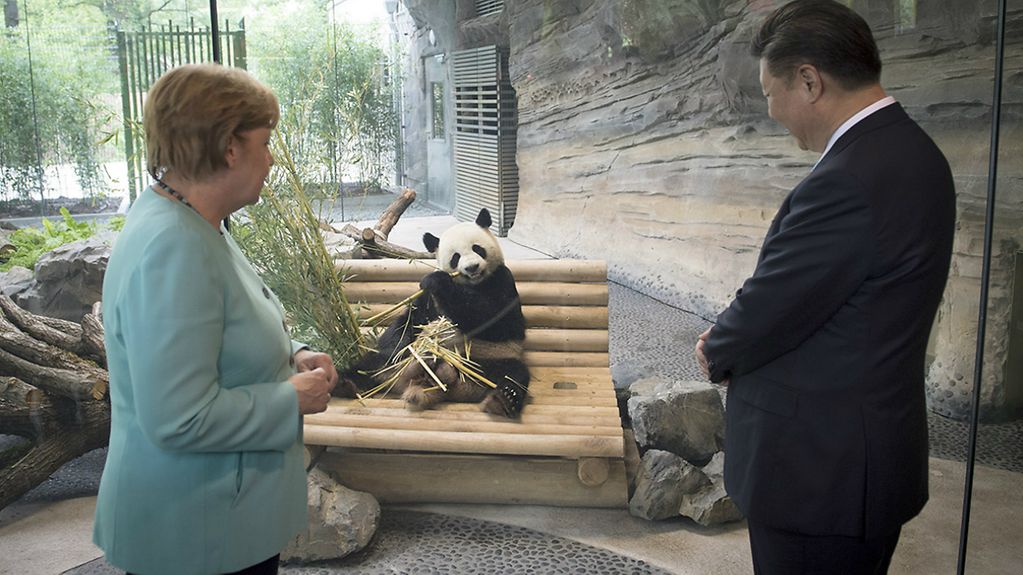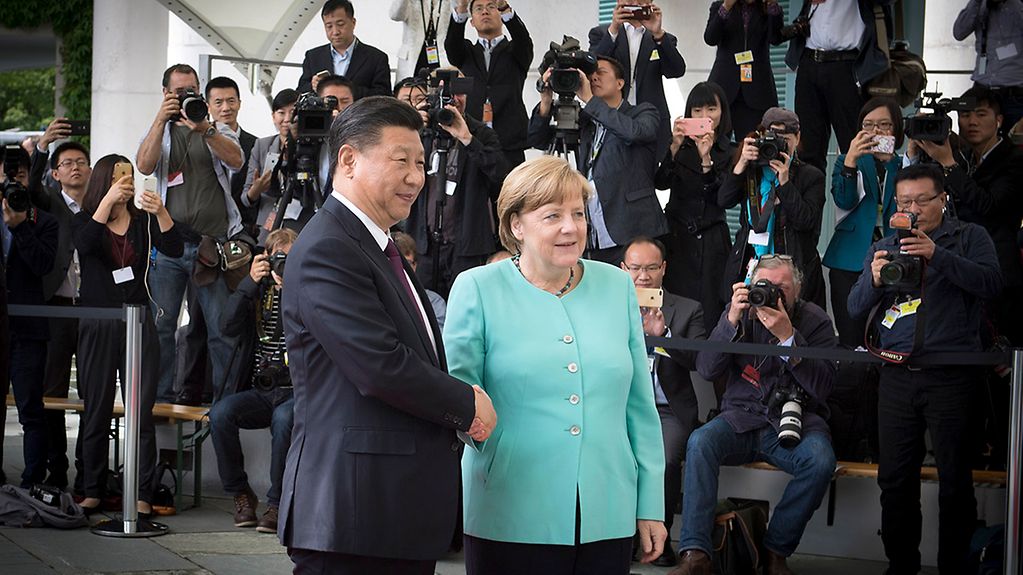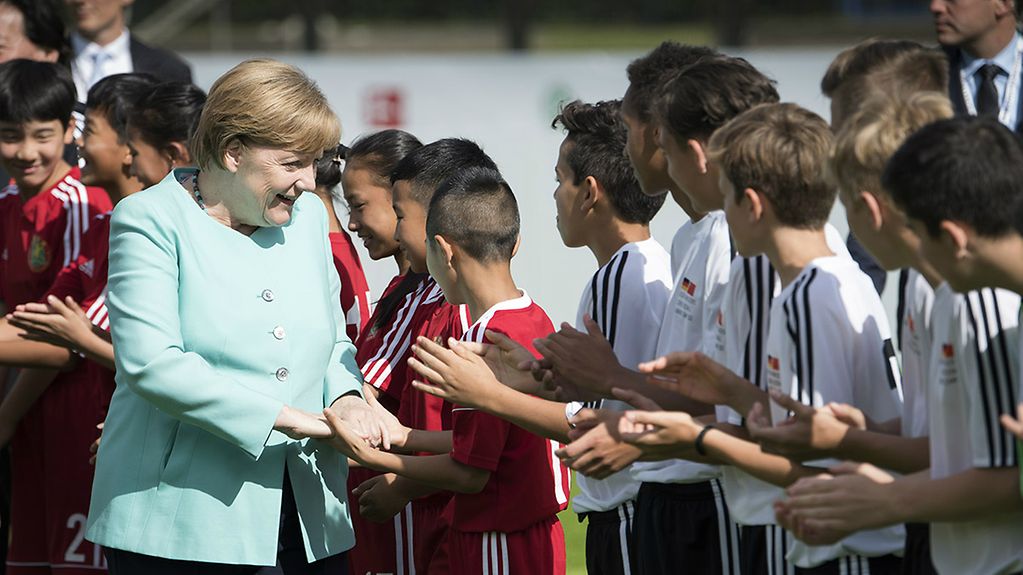Chinese state visit
Germany and China intend to further expand their relations in many areas, stressed Chancellor Angela Merkel and President Xi when they met at the Federal Chancellery. One main focus was this week’s G20 summit. Angela Merkel thanked President Xi for China’s support in preparations for the summit meeting in Hamburg.
6 min reading time

Merkel und Staatspräsident Xi eröffneten das Gehege für die Pandabären im Berliner Zoo.
Photo: Bundesregierung/ Bergmann
Looking back at the 2016 G20 summit in the Chinese city of Hangzhou, Chancellor Angela Merkel welcomed the chance to discuss the Hamburg summit with President Xi Jinping. Germany and China worked together very closely at that time, she said. "And now we would like to thank China for the support it has given us in preparing for this G20 summit in Hamburg," said Angela Merkel when she met the press with President Xi Jinping at the Federal Chancellery.
Fair balance for common interests
In her statement, the Chancellor reminded her audience that Germany and the People’s Republic of China can now look back on 45 years of successful diplomatic relations. "We no longer have a purely strategic partnership, we have what we term a comprehensive strategic partnership." And that, said, Angela Merkel, means that all aspects of society are covered by this cooperation.
The economic relations between the two countries play a very important role. They are close and diverse and have "attained an extremely wide scope". A whole series of agreements and declarations of intent were signed in the presence of the Chancellor and the President. "It is true to say that we no longer only buy and sell goods to one another, but that we are cooperating more and more closely and in ever greater depth in technological fields." Cooperation must become even closer on Industry 4.0 (the digitalisation of traditional manufacturing) and "China 2015".
Angela Merkel stressed she had made it clear "that we would like to be treated as equals at all times and that we make our markets accessible to one another. That is very important for our companies".
Strengthening civil society
Both countries intend to work more closely in the field of civil society, continued the Chancellor. Research cooperation and development were important topics of their talks – in view of the tens of thousands of Chinese citizens who are studying in Germany.
The person to person discussion "could still be greatly extended", declared Angela Merkel, with a view to interns. This can help us get to know one another better. In this context, she said, she is happy that "German foundations can now be registered in China under the provisions of the new law on non-governmental organisations". What is still needed is a widespread registration of organisations in the research sector, she added. Because the research bodies in particular are highly important for Sino-German cooperation. There are, however, "positive signals" in this context, said the Chancellor.
The human rights dialogue too must be continued with enthusiasm, and it must be ensured "that the various sections of society can voice their own interests". From her point of view, civil society cooperation could be stepped up, underlined Angela Merkel.
More intensive cooperation in many areas
Both in the cyber sector and in the fight against international terrorism, Germany and China have stepped up cooperation. "I think that there are still a lot of possible avenues for stepping up our cooperation in this field."

Angela Merkel welcomes the Chinese President at the Federal Chancellery
Photo: Bundesregierung/Bergmann
Germany supports the Chinese Silk Road Initiative with a view to achieving better interconnectedness. "We believe that we would like to become involved in projects of this sort and hope to see transparent tendering," said Angela Merkel unequivocally. Then Germany could do its bit towards realising projects of this sort.
The chance to engage together in third countries is another important aspect of cooperation. The two sides have, for instance, entered into an agreement to build a hydropower plant in Angola. Germany and China could also act together in Africa or Afghanistan – with the help of an agency for sustainable development. "That could be the nucleus of future cooperation of this sort," explained the Chancellor.
G20, EU, China and the international questions
With respect to the expiry of Article 15 at the WTO and the equal treatment of China, Angela Merkel reported that efforts have reached "the final phase of negotiations between the European Parliament, the European Council and the Commission". Germany will "try to force the speed" also with regard to the conclusion of an investment agreement which "can one day lead to a free trade agreement".
The Chancellor reported that she would be discussing other international issues with President Xi Jinping over lunch. The main topics of the G20 summit in Hamburg, North Korea and the role of the United Nations were all on the agenda. A start had been made the previous evening over dinner, she said.
"It is not an easy task to bring twenty states together in their developments and in terms of their ideas, but in the troika we collaborate closely, and China is part of this troika, along with Argentina. And that is why I believe and I hope that we will be able to circumnavigate the cliffs, even if I still do not know what the final result will be," explained Angela Merkel.
Berlin’s pandas are special ambassadors
Chancellor Angela Merkel and her Chinese guest were not prepared to forego one thing following their talks – a visit to the new panda couple Meng Meng and Jiao Qing in Berlin’s Zoo. In the afternoon the pandas were officially handed over to Germany. They are on loan from the panda breeding station in Sichuan province. The zoo has created an appropriate enclosure for these two valuable representatives of a threatened species. At a ceremony, Angela Merkel and President Xi Jinping officially opened the new enclosure.
The Chancellor said the pandas were "delightful diplomats". "I think that Jaio Qing and Meng Meng will be special ambassadors for our two countries and I hope they will bring pleasure to a lot of people," she said in her address.
"I think that this event is symbolic of the relations between our two countries," continued Angela Merkel. And she pointed to her far-ranging talks with President Xi. In terms of the economy, civil society and person to person contacts, a lot has already been achieved, she said. And work continues.
The two pandas, Meng Meng and Jiao Qing are to spend 15 years in Berlin. The loan was agreed between Berlin Zoo and the Chinese forestry commission. Lending pandas is a firm part of China’s foreign policy. Chancellor Angela Merkel engineered the deal in Beijing during her visit to China in late 2015.
U12 football match
There is also close cooperation between Germany and China in the field of football. President Xi Jinping’s visit to Berlin thus closed with a match between the under-12 teams from Germany and China in Berlin’s Olympia Park.

Angela Merkel exchanged a few words with the young players before the match
Photo: Bundesregierung/ Bergmann
On Tuesday evening Chancellor Angela Merkel met with Chinese President Xi Jinping for a private dinner and discussion with their respective spouses Professor Joachim Sauer and Mrs Peng Liyuan.